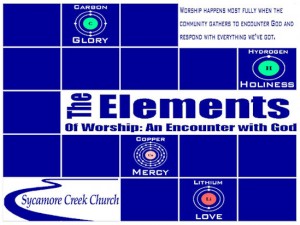
The First Carols of Christmas – Magnificat*
Sycamore Creek Church
December 14/15, 2014
Tom Arthur
Merry Christmas friends!
Have you ever sat in the back of a police car? Anyone want to claim that one? I will. I’ve only sat in the back of a police car once. It happened one night when I was in high school. Some friends and I decided to try to impress some girls one night by taking them to what we called “The End of the World.” “The End of the World” was a local quarry of some sort. There was a kink in the fence that we would sneak through and hang out near the “edge” of the world. As we finished up and were walking back to the car, we saw lights flashing and found police officers at our cars. We were questioned about what we were doing and when they found that we were not drunk or high, they let us go home on our own. I found out later that the company that owned the quarry was considering pressing criminal trespassing charges, but through my dad’s intervention, they dropped the charges. We deserved the charges. We had done the crime, but we were all shown some mercy that night.
Today we’re talking about mercy. Mercy is not giving or getting something bad that you deserved. This is in contrast to grace which we talked about last week. Grace is giving or getting something good that was unearned. A classic moment of grace is found in the movie, Les Miserables. Jean Valjean, a paroled convict, steals silverware from a bishop who offers him hospitality. When he is caught, the bishop shows him an amazing mercy.
So when was a time you received mercy? I asked my friends on Facebook about this and one friend, Tiffany, told of a time when she ran out of gas. She called her dad expecting to be berated for her mistake. Instead, he came and helped her saying, “We’ve all done it.” The mercy her dad showed her in that moment has informed all of her own parenting since. Another friend of mine, Marilyn, told the story of working in a high stress cancer clinic, having to do medical procedures and diagnostics she was not completely comfortable with. She was patiently helped by a more experienced and knowledgeable colleague who never seemed to get upset or impatient with her lack of knowledge. Another friend, Gretchen, told about a time when she was driving fifteen over and got pulled over. The cop only gave her a ticket for five over which saved her from getting points on her record.
Of course, the right mix of mercy and justice is not always clear. The struggle between mercy and justice is evident in places like Ferguson, Cleveland, and New York City where Michael Brown was shot by Darren Wilson, Tamir Rice was shot by Timothy Loehmann, and Eric Garner was put in a chokehold and strangled by Daniel Pantaleo. Then there’s protests that have followed, most of which have been peaceful but the ones that get media attention turn violent. There’s a problem we all face: We are quick to demand justice for others and mercy for ourselves. Portia, in Shakespeare’s The Merchant of Venice says, “In the course of justice, none of us should see salvation.” One thing we can all agree upon is this: The world is broken.
Enter the Christmas Story…
Today we continue in a series called The First Carols of Christmas. We like to sing Christmas Carols at Christmas but do you know about the first carols? The book of Luke is one of four books that tell the story of Jesus’ life. Luke’s telling of the birth of Jesus reads like a musical. People are talking normally and then all of a sudden, they break into song. There are four songs in Luke’s telling of Jesus’ birth and one scene that was later turned into a song. Last week we looked at the scene of the archangel Gabriel telling Mary she would be pregnant that was turned into a song, the Ave Maria. Today we’re looking at the song sung by Mary: The Magnificat. “Magnificat” means to magnify, expand, or make great. In the Magnificat, we’re going to learn about God’s mercy. We’ll learn two things:
- God uses his power in merciful ways.
- God is merciful by using his strength to humble the powerful and lift the lowly.
Mary is one of the lowly. She is a young girl who is probably twelve or thirteen years old. In ancient days, girls married and had children much younger than today. Mary lived in Nazareth, the low income housing of Galilee. Nazareth had a population of about a hundred. God chose to come to a girl in Nazareth rather than Sepphoris, the capital of Galilee four miles northwest. In Nazareth we find the most affordable housing option on the market: caves. Mary was likely visited by Gabriel in a cave. Ten days before Mary sings the Magnificat, Gabriel shows up and says, “Hail Mary, full of grace…” You’re going to become pregnant and have a child. Mary has not been sexually active so she is a bit befuddled by this declaration. So Gabriel says God is going to cause her to become pregnant. Now this is a detail of the story that is so familiar to us that it loses its impact on us. Thomas Paine, one of the great founding fathers of America was a deist and skeptic of most things religious. He wrote in his book, The Age of Reason, “Were any girl, that is now with child, to say, and even to swear to it, that she was gotten with child by a ghost, and that an angel told her so, would she be believed?” No. She’d be locked up in a mental institute. But back then she more likely would have been stoned by Joseph, her fiance’s family. Mary is terrified and goes to Elizabeth, her old cousin, who also has had a surprising pregnancy in her old age. Elizabeth lives a hundred miles away. It is not unrealistic to think that Mary’s family is attempting to cover up Mary’s unwed pregnancy. Mary comes to Elizabeth hoping to get some clarity on whether she is crazy or should be put death. Elizabeth is filled with God’s Spirit and tells Mary that she’s not crazy. Instead Mary is blessed. At this point, having Elizabeth’s confirmation, joy finally grips Mary and she breaks out into song—The Magnificat.
Now the Magnificat is not just a touching and beautiful little song. If you think that, you aren’t paying close attention. The Magnificat is a very dangerous song. It’s so dangerous that Kathleen Norris tells us that during the 1980s civil war in Guatemala, the military regime banned the reading of the Magnificat in public. It is said that elsewhere in Nicaragua peasants carried copies of the Magnificat during similar repressive regimes. The Chris Tomlin Song, My Soul Magnifies the Lord, a great song built on The Magnificat, cuts most of this dangerous stuff out. So now that you know the context of The Magnificat, let’s read it:
Luke 1:46-55 NRSV
Mary said,
“My soul magnifies the Lord,
and my spirit rejoices in God my Savior,
for he has looked with favor on the lowliness of his servant.
Surely, from now on all generations will call me blessed;
for the Mighty One has done great things for me and holy is his name.
His mercy is for those who fear him from generation to generation.
He has shown strength with his arm;
he has scattered the proud in the thoughts of their hearts.
He has brought down the powerful from their thrones,
and lifted up the lowly;
he has filled the hungry with good things,
and sent the rich away empty.
He has helped his servant Israel,
in remembrance of his mercy,
according to the promise he made to our ancestors,
to Abraham and to his descendants forever.”
I think we can learn at least two things from The Magnificat. First, God uses his power in merciful ways. Second, God shows mercy by humbling the powerful and lifting up the lowly. In other words, God shows mercy to those without power, which in comparison with God is all of us. If we go back to Portia in Shakespeare’s The Merchant of Venice, we see the same sentiment:
Earthly power doth then show likest God’s
When mercy season justice
~Portia (Shakespeare, The Merchant of Venice)
Last week I asked this question: are you more grace-full this year than you were last year. Today I ask you this question: Are you more merciful than you were last year? I’d like to offer you three tips on nurturing mercy in your life.
1. Forgive
Forgive those who have hurt you. Let me give you a very small example from my own life. Several years ago Sarah and I had a Subaru Legacy wagon that had served us quite well over the years. It had nearly 200,000 miles on it and was rusting out in several places. There were literally holes in the body of the car. One day someone hit our car and put a dent in one of the body panels that was all rusted. Technically, it was my right to have that panel replaced. But this would have likely caused his insurance to go up. The car was already rusted. It had another dent in the hood from the time I hit a deer. It wasn’t worth it. So I just told him to forget about it and we went on our way. I used my power in that moment to extend mercy rather than exact justice.
I’ve spoken a lot about forgiveness in the past. Today I want to focus on one very practical indirect step: go watch the movie coming out on Christmas day, Unbroken. You don’t have to go on Christmas day, but go see it or rent it when it comes out. Unbroken tells the story of Louis Zamperini, a WWII POW in Japan who forgives his captors even after horrendous torture. Louis Zamperini is a real person and the story is based on his life. Few of you have faced harder situations of forgiveness. You can learn powerful lessons about nurturing mercy through forgiveness from his story.
Become more merciful by practicing forgiveness in your life.
2. Advocate for those who have less power.
Second, nurture mercy in life by advocating for those who have less power. Recently I had the opportunity to meet Nate Aquino, a staff attorney at Legal Services of South Central Michigan. Nate’s job often consists of seeking mercy for others. Legal Services advocates in civil lawsuits for those who can’t afford to pay for an attorney. I learned that Nate could make a lot more money working elsewhere, but he likes making a difference and using his life’s privileges to serve those who haven’t had the same privileges. If Nate was a lawyer during Jesus’ time, it is likely that he would have been an advocate for Mary or her neighbors, because he does a lot of affordable housing legal work. One example of seeking mercy for the poor is in subsidized housing. Technically, someone who receives subsidized housing is not allowed to have anyone else live with them, but following this rule is not always as easy as it sounds, and if you are caught with someone else living with you, you will not be allowed to receive help with housing again. Nate advocates for people in this situation and is motivated by the bigger picture of showing mercy to those who don’t have as many resources in life. Nate’s work encourages me to be merciful by advocating for the poor.
I came across another moment of mercy when I was reading about the protests in Ferguson. Several black residents defended a gas station from looters that was owned by a white man. Of course, the white man was in the minority in that particular context, and his black friends used their power of being in the majority to defend their friend. While it may not be obvious from the media coverage, the peaceful protests outnumber the ones that turn violent. These are moments when people of all colors come together to advocate for those who have less power.
If you’re a supervisor, advocate for your employees. If you’re a husband, use your power to serve your wife rather than abusing her physically, verbally, or emotionally. If you’re a parent, advocate for children. If you’re in the majority, advocate for the minority. If you’re rich, advocate for the poor.
Become more merciful by using whatever power you do have to advocate for those who have less power.
3. Christmas Gifts
One last way to become more merciful is tied to how you celebrate Christmas. Every year I challenge you to give away as much as you spend at Christmas. This may seem a strange tie-in to mercy, but by nurturing a willingness to give up something (a gift a Christmas) to give something (a financial gift to a need), you nurture mercy in your own life. You are in essence, using the cultural power of Christmas gift giving to make a difference in our world. This Christmas season we’ll be receiving a special Christmas offering all the way through December, and especially on Christmas Eve, that will go to three things: our medical missions in Nicaragua, local emergency needs such as utilities and rent, and the Imagine No Malaria campaign of the United Methodist Church. Pauley Perrette from NCIS used her own celebrity power to advocate for Imagine No Malaria:
This year Sarah and I decided that it was time to change the way we celebrate Christmas going into the future for good. We wrote a letter to our families letting them know that we wanted them to no longer give us gifts for Christmas, but to give to our church’s Christmas offering whatever they would normally spend on us. So this week Sarah’s parents gave me my Christmas present, a check to our church for the Christmas offering. Together we all get the chance to become more merciful by giving Jesus a present on his birthday.
So three ways to nurture mercy in your life:
1. Forgive those who have hurt you.
2. Advocate for those who have less power than you.
3. Give away as much as you spend on yourself at Christmas.
A Community of Mercy
Imagine with me for a moment, a church full of people who were becoming more merciful. Imagine with me for a moment a church that was a training ground for forgiveness. Imagine with me a church that advocates for those on the bottom of society. Imagine with me a church where everyone gave away as much as they spent on themselves at Christmas. If you can imagine that, then you can imagine a church that blesses the community and region around us with God’s mercy. While we are not perfect, I believe we are a church that is on the mercy road. Why not extend an invitation to your friends, family, co-workers this Christmas to join us on that road of mercy? This Christmas Eve we’ll be one church in two locations over three days celebrating Christmas Eve with four services. Can’t make it on Christmas Eve because of family events? Come on the Eve of Christmas Eve. Can’t make it then? Come on Monday to Christmas in a Diner. Bring a friend and you both get a free $10 Christmas dinner. What three people can you invite to Christmas Eve this year? Would you spend some time praying about who you can invite and praying that God would open the door for you to invite them? Imagine with me a church twice our size helping more and more people to be more merciful this year than they were last year.
Here’s a favorite prayer of mine that speaks to God’s power and mercy. May it be true of us too.
O God,
you declare your almighty power chiefly in showing mercy and pity:
Grant us the fullness of your grace,
that we, running to obtain your promises,
may become partakers of your heavenly treasure;
through Jesus Christ our Lord,
who lives and reigns with you and the Holy Spirit,
one God, for ever and ever.
Amen.
*This sermon is adapted from a sermon originally by Adam Hamilton.






Recent Comments